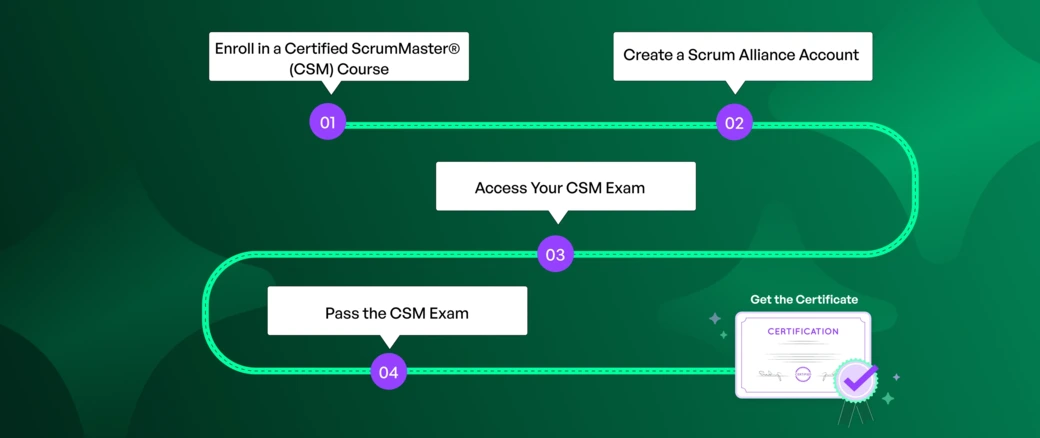What is Certified Scrum Master (CSM)?
The Certified Scrum Master (CSM) certification, offered by the Scrum Alliance, is a foundational credential that trains the professionals to the principles and practices of Scrum. This certification focuses on enhancing team collaboration, accountability, and iterative progress, equipping individuals with the knowledge and skills to effectively implement Scrum frameworks in their organisations. At StaraAgile, we provide what to expect in CSM training through a 2-day interactive online training by Certified Scrum Trainers (CSTs) having 15+ years of experience approved by the Scrum Alliance. Upon completing the training, you'll be well-prepared to take the CSM certification exam, which requires a detailed understanding of the Scrum framework and principles.
How to Set a CSM Study Plan: Step-by-Step Guide
To start with the CSM study, the first step is to enroll in an institute to get certified as a Scrum Master. The next step-by-step procedure to acquire CSM skills and knowledge is:
1. Understand the CSM Certification Requirements:
Familiarise yourself with the Scrum Alliance’s CSM certification requirements, including the course format, duration, and exam details.
2. Gather Study Materials:
Get the official CSM course materials including the Scrum Guide, handouts, and recommended reading. Utilise online resources such as study guides, blogs, and videos to help in your learning.
3. Create a study schedule:
Set a realistic study schedule which is achievable. Allocate time for each topic and study session. Break down your study plan into manageable chunks, focusing on one topic at a time.
4. Focus on key concepts:
Study the Scrum framework, including events, roles, and artefacts. Understand the principles and scrum values including teamwork and accountability.
5. Practice with sample questions:
Practice mock questions and case studies ro test your understanding. Identify areas where you need improvement nd focus your study efforts accordingly.
6. Review and Refine:
Regularly review your study progress and refine your plan as needed. Make sure you are on track to meet your certification goals.
Resources for CSM Study Plan
1. Official Resources
Scrum Alliance: The official website for Scrum Alliance, offering a resource library, webinars, articles, guides, event updates and certification information to help you get started with your CSM study guide.
Scrum Guide: The official guide to the Scrum framework, practices, and principles, providing a comprehensive understanding of Scrum methodology.
2. Online Courses and Training
Scrum Alliance-approved training providers: Enroll in StarAgile to get trained from authorised trainers and Certified Scrum Master Certification, ensuring you receive high-quality training and guidance from experienced professionals.
3. Practice Exams and Quizzes
Srum Alliance Practice exam: An official practice exam for CSM certification, simulating the actual exam experience and helping you assess your readiness.
CSM Practice Test: Online practice tests and quizzes are designed to assess your knowledge on the scrum master study guide and identify areas for improvement, ensuring you are well-prepared for the CSM certification exam.
Mistakes to Avoid While Preparing the CSM Study Guide
Preparing for the Certified ScrumMaster (CSM) certification exam requires dedication and a well-structured study plan. Here are some common mistakes to avoid while preparing for the CSM certification:
1. Insufficient Study Materials:
Relying on a single source of information can be limiting. Make sure to use a variety of study materials, including CSM certification study material, to get a comprehensive understanding of the Scrum framework and principles.
2. Lack of Practice:
Practice is key to passing the CSM certification exam. Utilise online practice exams, quizzes, and CSM certification study material with practice questions to assess your knowledge and identify areas for improvement.
3. Inadequate Understanding of Scrum Framework:
Failing to grasp the fundamental principles and values of Scrum can lead to confusion and mistakes. Ensure you have a solid understanding of the Scrum framework and its application.
4. Not Joining a Study Group:
Studying alone can be isolating. Joining a study group or online community can provide valuable support, insights, and motivation.
5. Poor Time Management:
Design a study routine and stick to it. Give sufficient time for each topic and practice questions to ensure you're well-prepared for the exam.
6. Not Reviewing and Reflecting:
Regular review and reflection are crucial to reinforcing your understanding of Scrum concepts. Set a time aside to review your notes, practice questions, and reflect on your learning.
Conclusion
Preparing for the CSM certification exam requires a thorough understanding of the Scrum framework and principles. By avoiding common mistakes, utilising effective study strategies, and leveraging reliable CSM certification study material and certified Scrum Master study guide resources, you can ensure a successful outcome. Stay focused, motivated, and committed to your goals, and you'll be well on your way to becoming a certified Scrum Master. Good luck on your CSM certification journey!
FAQs
1. How can I effectively use a CSM study guide to prepare for the exam?
To effectively use a CSM study guide, review the material thoroughly, take practice exams to assess your knowledge, and focus on areas where you need improvement. It's also helpful to join a study group or online community for support.
2. What topics are covered in a typical CSM certification study guide?
A typical CSM certification study guide covers topics such as the Scrum framework, roles and responsibilities, Scrum events, artefacts, and Agile principles. It may also include practice questions and case studies to help reinforce your understanding of the material.
3. How long does it take to prepare for the CSM certification exam?
The time it takes to prepare for the CSM certification exam can vary depending on your prior knowledge and experience with Scrum. On average, it can take around 1-3 weeks of dedicated study and review to feel prepared for the exam, assuming you've attended a CSM course and have a good understanding of Scrum principles.







 In today's fast-paced and continuously evolving business environment, corporate professionals must stay updated to maintain a competitive edge in the job market.
In today's fast-paced and continuously evolving business environment, corporate professionals must stay updated to maintain a competitive edge in the job market. 






